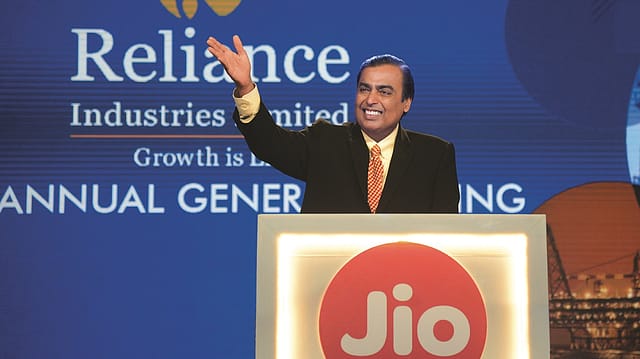Jio Platform’s valuation may only be second to Amazon
ADVERTISEMENT

Reliance Industries Ltd’s (RIL) move to create a new organisation structure by creating a super subsidiary that will be the principal holding company for its telecom services (Reliance Jio Infocomm) and digital services (a suite of apps and strategic investments) may well make it the second highest-valued digital platform company in the world after Amazon, when considering EV/Ebitda (enterprise value by earnings before interest, tax, depreciation and amortisation).
On October 25, the oil-to-yarn and retail-to-telecom business house announced that RIL will be creating a new wholly owned subsidiary called Jio Platform that will house the company’s telecom and digital assets. Around ₹1.08 lakh crore of debt will be transferred to RIL’s standalone balance sheet, in lieu of which the standalone company will get an equal amount of capital infusion via optionally convertible preference shares (OCPS) in Jio Platform. The latter will also take over RIL’s present equity investment of ₹65,000 crore into Jio. Consequent to these proposed transactions, Jio, RIL says, will become “virtually net debt free” by 2020, with the exception of spectrum-related charges.
Though the proposed restructuring will not alter RIL’s consolidated debt position, it will help deleverage the digital platforms and telecom services business, priming it for a potential stake sale that RIL’s chairman Mukesh Ambani has been contemplating for a while. Debt on the books of the standalone company, which houses the energy and petrochemicals business, will go up commensurately, but repatriation of proceeds from the stake sale in Jio Platforms, the proposed sale of a 20% stake in RIL’s oils-to-chemicals business to Saudi Aramco, and monetisation of an infrastructure investment trust that holds Jio’s telecom towers and optic fibre assets, will help bring this leverage down over time.
“Given the reach and scale of our digital ecosystem, we have received strong interest from potential strategic partners,” Ambani said in a statement issued to announce the reorganisation on October 25. “We will induct the right partners in our Platform Company, creating and unlocking meaningful value for RIL shareholders.”
Most analysts expect the transaction to imply an enterprise value of $65 billion-$70 billion, which would make the digital platform the most valued in the world in terms of EV/Ebitda after Amazon. A Jefferies research report pegs RIL’s EV/Ebitda at 22.6 (assuming a valuation of $65 billion-$70 billion). Amazon enjoys an EV/Ebitda of 23.4; this is higher than its other peers such as Alibaba at 22.1, Alphabet at 15.5, Tencent at 19.6, Facebook at 13.9, and Apple at 17.5.
A recent CLSA research report states that versus the expectation of a $65 billion-$70 billion for Jio Platform that the restructuring can help unlock, its current sum-of-the-parts estimate assigned a valuation of $45 billion to this business. “In most valuations used by the Street, including ours, Jio is valued mainly as a telecom service provider with no value ascribed for Jio’s suite of apps, digital investments and capabilities like AI, IoT etc. This exercise aims to correct that positioning. Indeed, some of Jio's apps like TV, music and cinema are among the best in their respective categories,” the CLSA report states.
The transaction will also help bring down Jio Platform’s leverage from around 7.5 times of annualised Ebitda for the second quarter of FY20 to 2.5 times, the Jefferies report says. This will also bring it closer to the global benchmark of technology platforms with low leverage.
According to a recent media report, the new structure wherein the telecom and digital services businesses are housed under separate companies could also help Jio save on adjusted gross revenue (AGR)-linked payments to the government. A recent Supreme Court ruling held that non-core revenue from valued-added services will be considered while considering a telco’s AGR, a percentage of which has to be paid as dues to the government. Transferring the digital services to another entity that doesn’t hold the spectrum and telecom licence might ensure that revenue from such services doesn’t fall under the definition of AGR, which can help Jio save on such costs.
A Kotak Institutional Equities research report pointed out that a debt-free Jio would also be well-positioned to capitalise on a situation wherein the financials of incumbent mobile service providers, especially Vodafone Idea, are likely to come under severe pressure due to the Supreme Court’s ruling on AGR and the consequent dues for past years that these companies, which are pleading with the government for some respite, might need to cough up.